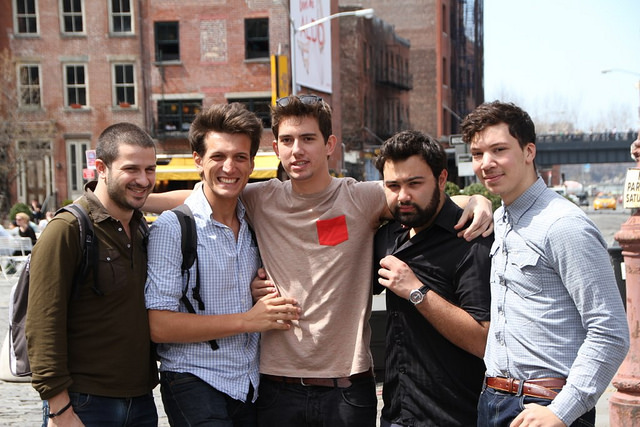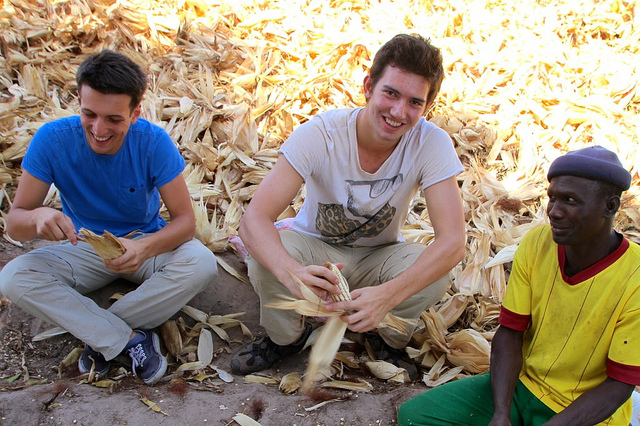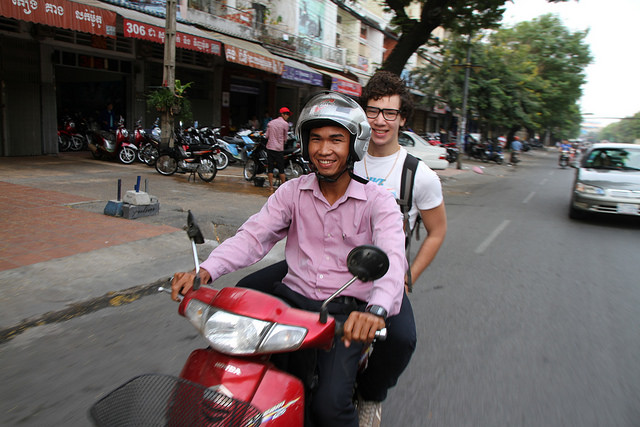Victor, Josselin, Samuel, Ilan and Ismael are atheist, agnostic, Christian, Jewish and Muslim, in that order. With religious tolerance in mind, the five twenty-something French students, decided to travel across the world from July 2013 to June 2014 for their Interfaith Tour. The goal? To raise awareness of the many interfaith projects already out there making a difference.
Here's a trailer of the project:
In French-language interviews with Global Voices, the group offered details on the project and described their experiences along the way.
Global Voices (GV): After your journey around the world, you have now begun a tour of France to share your experiences. How has the project been received in France so far?
Victor (athée): Notre accueil en France a été très bon. Même meilleur que ce qu’on aurait pu penser. Les gens en France s’intéressent à l’inter-religieux et à la dimension internationale et sociale qu’on lui donne. Beaucoup de personnes viennent nous voir à la fin de nos interventions ou conférences et nous remercient, émus, du travail effectué pendant ce tour du monde et de l’espoir que ça leur donne. L’impact journalistique est également impressionnant. La rédaction d’un grand quotidien français nous a appelé pour nous expliquer que l’article relatant notre voyage sur leur page Facebook avait été le plus partagé et commenté depuis 2 ans, devant ceux sur Barack Obama ou François Hollande.
Victor (atheist): The tour was well received in France, better than we imagined. People in France are interested in inter-religious topics and the international component that we provided. Many people come to see us at the end of our talk to thank us, they were moved by the work we achieved during this tour and the hope it gives them. The impact in the media was also quite impressive. A French daily newspaper called us to tell us that the article about our trip on their Facebook page was the most shared and commented of the past two years, ahead of articles about Barack Obama or François Hollande.
GV: Long trips and close quarters with others often lead to self-introspection and additional personal changes. Has your view of your faith evolved during the trip? If so, how?
Josselin (agnostique): Ma foi n’a pas évolué, même si elle a été remise en question, parfois. Ma situation particulière d’agnostique dans le projet a fait souvent croire aux gens que j’étais en recherche d’une religion mais ce n’était pas du tout cela. J’ai été renforcé dans mon agnosticisme, puisque je crois en Dieu, où en tout cas à ce que j’appelle Dieu, sans me reconnaître dans aucune religion, ni pratiques confessionnelles particulières. Après ce voyage je suis d’autant plus convaincu que nous avons tous le même Dieu et que Chrétiens et Musulmans, par exemple, empruntent simplement un chemin différent pour atteindre Dieu.
Josselin (agnostic): My faith has not changed, although it has been questioned at times. Because of my particular belief, agnostic, within the scope of the project, people often believed that I was looking for a religion to adopt, but it was not like that at all. The tour, in fact, strengthened my agnosticism because I believe in God, or in this case the being I call God, without seeing myself belonging to any religion or current religious practices. After this trip, I am even more convinced that we all have the same God and that for instance, Christians and Muslims simply take different paths to reach God.
Samuel (chrétien): Ma foi chrétienne est intrinsèquement en mouvement puisque elle est une relation. Elle bouge, se meut, évolue. Un déplacement autour du monde est forcément l’occasion d’un déplacement intérieur. Je n’ai pas trop souffert de remises en questions radicales à l’exception des trois mois en Asie de décembre à février, de Bombay à Jakarta en passant par Tokyo, Pékin et Kuala Lumpur. Cette région du monde est un désert des communautés chrétiennes et il peut s’avérer difficile de ne pas se sentir seul. Ce sont des grands moments de pauvreté qui m’ont permis d’enraciner ma foi dans la bonne terre, celle qui n’a pas besoin d’un contexte favorable pour porter du fruit.
Samuel (Christian): My Christian faith is always evolving because it is a relationship. It changes, mutates, evolves. Traveling around the world is always an opportunity for internal change. I have not been subjected to too much radical questioning with the exception of three months in Asia from December to February, from Mumbai to Jakarta to Tokyo, Beijing and Kuala Lumpur. This region is a desert of Christian communities and it can be difficult not to feel alone. These are great moments of poverty that allowed me to root my faith in the good soil, which does not require a favorable context to bear fruit.
Ilan (juif): Dans la Torah, il est dit VéAhavta IreHa KamoHa (Tu aimeras ton prochain comme toi-même). Ce commandement, base de la vie en société, a guidé mon tour du monde. Constant aller-retour entre l’Entre-soi et l’Autre, qui s’alimente au gré des expériences de vie. A travers la rencontre avec l’Autre, j’ai renforcé mon appartenance au peuple juif, à son histoire singulière et à ses valeurs universelles. Le voyage a fini de me « convertir » à la fraternité sans pour autant oublier, à aucun moment, qui je suis et d’où je viens. Ce postulat – questionnement de soi et approfondissement de son identité – me semble être fondamental quand on se projette dans des rencontres, aussi belles et enrichissantes soient-elles.
Ilan (Jewish): The Torah says “VéAhavta IreHa KamoHa” (Thou shalt love thy neighbor as thyself). This command is the foundation of life in society and it has guided me throughout the tour. The constant back and forth between our inner-selves and others has fed my life experiences. Through encounters with the Other, I reinforced my sense of belonging to the Jewish community, its unique history and its universal values. The trip has definitely “converted” me to this brotherhood but I never forgot who I am and where I come from. This dual action – self-doubt and identity reinforcement – seems fundamental to me when we project ourselves when we meet other people. This action is independent of how beautiful and rewarding the meetings with others are.
Ismael (musulman): Je ne sais pas si on peut parler d’évolution dans ma foi mais une chose est sûre c’est que ce voyage m’a ouvert au monde, bien plus que je le pensais. On a souvent parlé d’inter-religieux pendant ce tour et durant les deux ans de mon adhésion à Coexister et en tant que musulman j’étais toujours ravi de travailler avec des personnes de confessions différentes mais pour ce qui est des personnes de ma communauté, j’entends par là les musulmans d’autres obédiences que les sunnites, je n’étais pas fermé mais très méfiant. Et pendant ce tour j’ai eu l’occasion de voir à quel point la communauté musulmane mondiale était divisée et à quel point il était urgent pour moi de m’impliquer autant dans l’intra-religieux que dans l’inter-religieux mais je garde espoir car je me souviendrais toute ma vie ou après la prière du vendredi dans la grande mosquées de Mascate en Oman j’ai pu sans le savoir au début de la prière, prier avec un ibadite et un chi’ite à mes côtés et donc me conforter dans l’idée que lorsqu’ on veut créer du vivre ensemble on peut toujours trouver des personnes prêtes à nous aider.
Ismael (Muslim): I am not sure if I'd say that my faith has evolved, but one thing is for sure: This trip has opened my world much more than I thought. We often talked about inter-religious themes during this tour and during my two years as a member of the Coexist Association. As a Muslim, I was always happy to work with people of different faiths. However, with people in my own community, and by that I mean Muslims from other denominations than Sunnis, I was not as open and a bit suspicious. During this tour, I had the opportunity to see how the global Muslim community was divided and how urgent it was for me to get involved in both the intra-religious and the inter-religious aspect of our work. But I have hope that we can do better because I will always remember that day after a Friday prayer at the great mosques of Muscat in Oman when I unknowingly prayed next to an Ibadi and a Shiite by my side. That day reinforced my belief that when we want to live together, we can always find people willing to help us in that endeavor.
Victor: J’ai été renforcé dans mon approche du monde, mais aussi dans la conviction qu’il est nécessaire de dialoguer non pas simplement entre croyants, mais aussi avec les non croyants, humanistes et finalement l’ensemble de la population. En France il y a un tiers de croyants, un tiers de non croyants et un tiers d’agnostiques, dès lors, puisque l’inter-religieux est pour nous un outil de cohésion sociale, il faut dialoguer avec tous. Je suis renforcé dans mon approche du monde au contact de celle des autres. C’est ce que nous appelons l’effet miroir. Par ailleurs nous avons réussi entre nous a trouver la frontière entre affirmation de son identité et réceptivité à l’altérité, ce que nous appelons la Coexistence Active et qui est au cœur du message de l’association COEXISTER.
Victor: I was strengthened in my vision of the world, but also in the belief that it is necessary to start a conversation not just between believers, but also with non-believers, humanists and eventually, the whole world. In France, one-third of the population are believers, one-third are non-believers and the final one-third are agnostics. Therefore, inter-religious conversation is our tool for social cohesion and we need to discuss with everyone. I am reinforced in my approach to the world when I am in contact with others. This is what we call the mirror effect. Furthermore, we have managed to identify the line between affirming our identity and being open to otherness. This is what we call Active Coexistence and it is at the heart of the message of the COEXIST association.
GV: Five different denominations but no woman in the group. Was it a deliberate choice or simply how things turned out?
Victor: Il y avait une jeune juive dans l’équipe initiale, Raffaëla, qui a travaillé de longs mois avec nous sur le projet mais l’a malheureusement quitté un mois avant de partir par peur et il faut le dire, avec de la pression familiale. Ce n’est pas un choix délibéré, nous avons subi le fait de n’être simplement que des hommes dans l’équipe et nous avons essayé du mieux que nous avons pu de palier à cette situation en invitant à cinq reprises des jeunes femmes de notre association française Coexister de confessions différentes (une athée à Berlin, des chrétiennes en Turquie, une bouddhiste en Inde, une musulmane à Singapour et Jakarta).
Victor: The original team had a young Jewish woman named Raffaëla. She worked with us for a few months on preparing the project but unfortunately she left a month before we begun the tour out of fear and, it must be said, because of family pressure. Having no women in the team is not a deliberate choice, it was just something that happened and we tried as best we could to remedy this situation by inviting young women from the CoExist association of different faiths (an atheistic in Berlin, a Christian in Turkey, a Buddhist in India, a Muslim in Singapore and Jakarta).
GV: During the trip, you had the opportunity to meet with Pope Francis, the Grand Imam of the Al-Azhar mosque in Cairo and top level politicians including Laurent Fabius, the French minister of foreign affairs. In total, several hundred people, religious leaders and local figures of inter-religious dialogue. Which one had an important impact on you?
Victor: La rencontre avec le Pape est évidemment l’un des moments marquants de ce tour, même pour des athées ou agnostiques. Rencontrer pendant une dizaine de minute l’homme le plus médiatisé du monde, l’autorité ultime d’une des plus grandes religions sur Terre, est forcément impressionnant et même émouvant. Rencontrer ces leaders religieux ou politiques est extrêmement important pour nous évidemment pour savoir notamment ce qu’ils pensent de l’inter-religieux et dans quelle mesure ils sont prêts à s’engager dans cette voie là, mais il faut bien comprendre également que la majorité des personnes ciblées et rencontrées pendant ce voyage étaient de parfaits inconnus qui malgré tout travaillent depuis des années dans la paix et la réconciliation entre les communautés.
Victor: The meeting with the Pope was obviously one of the highlights of this tour, even for the atheists or agnostics. Meeting for 10 minutes the man with the most media coverage worldwide and the top authority in one of the largest religions is necessarily very impressive and emotional. Meeting religious and political leaders is extremely important for us to know what they think regarding some inter-religious topics and to what extent they are willing to engage in this topic. Still, it should also be clear that the people we really wanted to meet during this trip were common folks who nonetheless worked for years towards peace and reconciliation between communities.
GV: What region has had the most significant impact on the project?
Victor: Des dizaines de régions du monde ont été marquantes pendant ce tour du monde, et ce n’est forcément pas aisé d’en choisir une en particulier mais le Burkina Faso reste l’un des pays les plus marquants selon moi. Alors que ses voisins comme le Nigéria, ou le Mali connaissent de vives tensions communautaires ou ethniques, le Burkina Faso fait exception dans cette zone d’Afrique de l’Ouest en ce qui concerne la cohésion sociale et le vivre ensemble. Chrétiens, musulmans et animistes vivent en parfaite harmonie notamment grâce à une tradition centenaire de « parenté à plaisanterie ». Cette tradition se résument à créer du lien social par le mariage inter-ethnique et donc souvent inter-religieux et en désamorçant les tensions sociales par le rire. Des ethnies qui plaisantent sont des ethnies liées par des mariages. Dans la même famille au Burkina Faso, vous pouvez trouver plusieurs religions qui coexistent et cohabitent sereinement. Plaisanter signifie également institutionnaliser les clichés sur l’autre à l’oral, pour se dire tout ce qu’on pense, et ne pas retrouver des tensions ou des frustrations dans des couches de populations.
Victor: Dozens of regions in the world have been outstanding in our opinion during this world tour, and it is not easy to choose a specific one, but Burkina Faso remains one of the most striking countries in my view. While its neighbors such as Nigeria and Mali are experiencing religious or ethnic tensions, Burkina Faso is an exception in West Africa regarding social cohesion and togetherness. Christians, Muslims and animists live in perfect harmony thanks to a century-old tradition of “humorous relationship”. In short, this tradition strives to create social bonds through inter-ethnic and inter-religious marriage and defusing social tensions through laughter. People who tell ethnic jokes to one another are also linked through ethnic marriages. In the same family in Burkina Faso, you can find several religions that coexist and live together peacefully. Humor also means expressing stereotypes about each other vocally, to say what we think and in doing so, defuse tensions or frustrations throughout all the layers of the populations.
GV: Pope Francis brings a fairly modern vision of Catholicism. According to you, who are the religious leaders of other monotheistic religions also offering a modern vision of their faith?
Victor: Le grand imam d’Al-Azhar va également dans ce sens et appelle les musulmans à coexister activement avec les autres religions. Mais des leaders religieux moins connus comme le Grand Rabbin de Pologne ou le Patriarche Maronite du Liban sont acteurs du dialogue et de l’action inter-religieuse.
Victor: The Grand Imam of Al-Azhar also provides a similar view of Islam and he urges Muslims to actively coexist with other religions. But lesser known leaders such as the Chief Rabbi of Poland or the Maronite Patriarch of Lebanon are leading figures in inter-religious dialogue and action.
GV: What happens next with the project? Is another tour planned?
Victor: Oui, ce n’est qu’un projet pilote, nous espérons créer un mouvement InterFaith Tour avec une nouvelle équipe qui partirait chaque année pour découvrir de nouvelles zones du monde ou approfondir le travail dans certains pays où ne nous sommes pas restés assez longtemps.
Victor: Yes, this is only a pilot project. We hope to create a movement based on the InterFaith Tour. A new team would go on tour every year to discover new regions of the world or continue the work we started in countries where we did not stay long enough.










3 comments